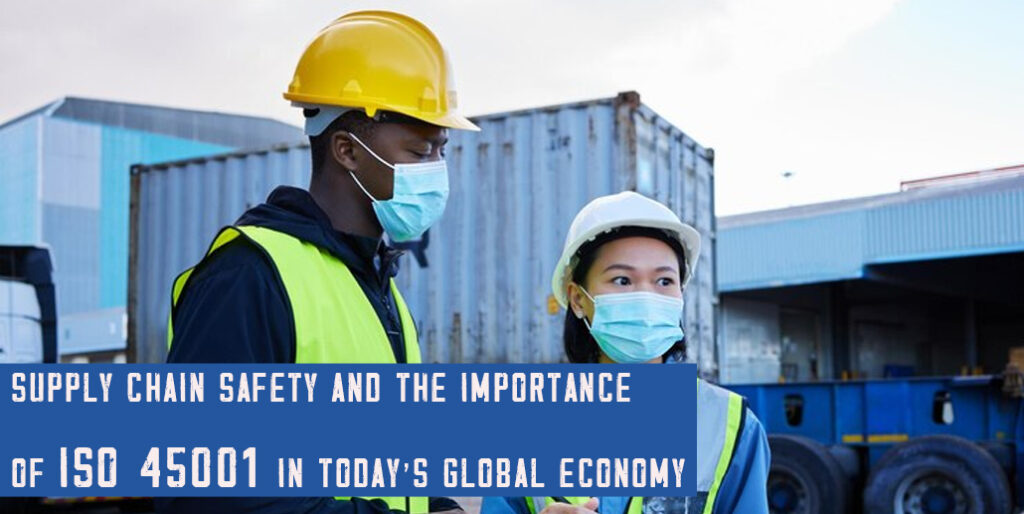
Supply chains in today’s world have become increasingly complex, with numerous stakeholder’s involved. In the current international economy, this form of supply chains poses serious issues, especially from a security perspective. For effective supply chain security throughout the economies, the adoption of ISO 45001, the leading global standard on OH&S is critical. This blog looks to examine how ISO 45001 certification can be used to improve supply chain safety across the globe.
Understanding ISO 45001 certification
In essence, ISO 45001 certification intends to provide guidance to organizations in establishing policies and practices pertaining to health and safety. It emphasizes a proactive method to figuring out risks, assessing dangers, and enforcing controls to prevent workplace accidents. The aim is to anticipate issues, evaluate their severity, and implement strategies that would prevent workplace injuries. The flexibility built into the standard means that it can be applied by any organization, regardless of its size or field of practice. This is particularly advantageous for companies operating in international supply chains.
Enhancing Safety Standards Across Supply Chains
ISO 45001 certification was developed to assist organizations comply with primary legislation on protective risks at work. It takes the positive approach of preventing physical and emotional injuries at the workplace. The standard is designed to be relevant to any organization, irrespective of its size or industry, making it specifically relevant for corporations running within international supply chains.
- Systematic Risk Management: One of the number one advantages of ISO 45001 is its systematic method to risk control. By requiring businesses to discover probable dangers and determine related risks, the standard encourages a culture of protection that extends throughout the supply chain. For instance, businesses can conduct regular audits and checks to make sure compliance with protection protocols at all stages of operation, from production centers to logistics partners. This systematic method notably complements overall supply chain safety.
- Legal Compliance and Reputation: Compliance with local and global protection policies is essential for companies running globally. ISO 45001 improves their reputation amongst customers and stakeholders. Companies who have this certification, show their dedication to preserving high protection standards. This can majorly impact a customer’s decision while choosing suppliers. This dedication to supply chain safety can result in more secure business relationships and improved consumer loyalty.
- Improved Communication and Collaboration: Effective communication is critical in dealing with an international supply chain. ISO 45001 promotes transparency through encouraging businesses to share safety information with the stakeholders such as, suppliers and partners. This collaborative approach builds trust and ensures that all stakeholders share a commitment to safeguarding safe working environments. For example, logistics businesses can share best practices with their companions to mitigate threats related to transportation and dealing with of goods. Ultimately, contributing to better supply chain safety.
- Continuous Improvement Culture: ISO 45001 emphasizes the significance of non-stop development in health and protection control systems. Organizations should regularly evaluate their processes, analyze past incidents, and implement corrective actions. This ongoing dedication to development not only improves workplace protection but also contributes to overall operational performance inside the deliver chain. By fostering a lifestyle of non-stop development, businesses can make certain that supply chain safety stays a top priority.
- Global Applicability: Given the global nature of many supply chains, ISO 45001`s international applicability is a substantial advantage. The standard offers guidance that may be tailored to unique cultural contexts and regulatory environments. This will enable businesses to implement consistent protection policies across borders. This versatility is especially important in businesses like manufacturing and logistics, where activities could involve numerous countries with different protection rules.
Linking ISO 45001 to Supply Chain Safety Regulations
In an era of growing regulatory scrutiny, linking ISO 45001 to supply chain safety policies is essential for companies working globally. Governments worldwide are enforcing stricter legal regulations to make sure secure and ethical practices throughout supply chains. Making compliance a top precedence for businesses. ISO 45001 offers a thorough framework that facilitates companies meet these legal requirements whilst improving workplace protection.
By adopting ISO 45001, businesses can systematically become aware of risks and examine them within their own operations. As well as among their suppliers and partners. This proactive technique allows companies to mitigate potential protection problems before they amplify into legal or reputational problems.
Furthermore, ISO 45001 promotes transparency and accountability, encouraging open conversation about protection practices throughout the supply chain. This is especially vital in industries in which risky practices can result in severe accidents. By fostering a culture of safety and compliance, companies can construct secure relationships with responsible suppliers and show their dedication to moral practices. Ultimately, integrating ISO 45001 into supply chain management guarantees compliance with new and emerging policies. Moreover, it also contributes to safer working environments and sustainable business operations.
Conclusion
As global supply chains keep growing in complexity, making sure protection throughout all stages of operation becomes increasingly critical. ISO 45001 gives a comprehensive framework for coping with occupational health and protection hazards effectively. This will help improve compliance with legal requirements while fostering a culture of non-stop improvement. By adopting this standard, companies can protect their workers and reinforce their reputation and operational efficiency within the international marketplace.
In today`s interconnected world, prioritizing supply chain safety through standards like ISO 45001 is not only a regulatory requirement; it is a vital aspect of sustainable business practices that protect workers` well being while driving organizational success. Emphasizing supply chain safety through ISO 45001 will as a lead to more secure workplaces and extra resilient operations in an ever-evolving international economy. For more information, visit our website.
